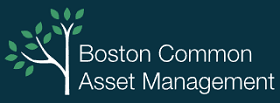Boston Common Asset Management is a woman-led and majority employee-owned company. The financial advisor firm is based in Boston with billions in assets under management (AUM).
The firm's advisors principally engage in investment portfolio management through a variety of different strategies, with a particular focus on socially responsible investing (SRI). These are largely based on equity investments in various market sectors and capitalizations. The firm also manages its own mutual funds and private commingled investment vehicles.
Boston Common Asset Management operates as a fee-only firm, as the entirety of its compensation comes from client-based fees. This is much different from a fee-based firm, which also receives outside forms of compensation like insurance commissions. By skipping out on such commissions, a fee-only firm like Boston Common Asset Management avoids many potential conflicts of interest.
Boston Common Asset Management Background
Boston Common Asset Management was founded in Boston in 2002 by Geeta Aiyer, the firm's president. Aiyer and her colleagues place an emphasis on impact investing and socially responsible investing. The firm is female-led and mostly owned by its employees, though Aiyer is the principal shareholder.
Of Boston Common's on-staff financial advisors, 12 hold the chartered financial analyst (CFA) designation.
Boston Common Asset Management Client Types and Minimum Account Sizes
Boston Common manages accounts for high-net-worth and non-high-net-worth individuals, investment companies, pooled investment vehicles, retirement plans, insurance companies, businesses and charitable organizations.
The minimum account sizes at Boston Common Asset Management vary substantially by account type and investment strategy:
- Separate Accounts
- U.S. Core and Value Equity: $1,000,000
- Balanced and Multi-Asset: No specific minimum
- International (EAFE) and Global (ACWI): $5,000,000
- International (ACWI x U.S.): $10,000,000
- Emerging Markets (EM): $10,000,000
- Separate Small-Cap Equity: $500,000
- Mutual Funds
- Boston Common International Fund (BCAIX): $10,000
- Boston Common U.S. Equity Fund (BCAMX): $10,000
- Boston Common ESG Impact Emerging Markets Fund (BCEMX): $10,000
- Private Commingled Strategies
- Boston Common International Equity: $2,000,000 (only available solely to accredited investors)
- Boston Common International Catholic: $2,000,000 (only available solely to accredited investors)
- Boston Common International Sustainable Climate: $1,000,000
- Boston Common Sustainable Emerging Markets (EM): $1,000,000 (only available solely to accredited investors)
- Boston Common Global Impact: $1,000,000 (only available solely to accredited investors)
- Boston Common U.S. Community Investing: $1,000,000
- Boston Common Catholic Emerging Markets (EM): $1,000,000
The firm reserves the right to waive or negotiate any of these minimums.
Services Offered by Boston Common Asset Management
There are a wide range of financal services available through Boston Common Asset Management. The firm's portfolio management offerings include separate accounts, mutual fund management and private commingled strategies. It offers portfolio management on a discretionary basis for clients with AUM, but also provides non-discretionary consulting.
Boston Common Asset Management Investment Philosophy
Boston Common Asset Management places a strong emphasis on taking into account environmental, social and governance (ESG) criteria into their investing strategies. The firm begins its portfolio construction process by doing in-depth research on domestic and international equity markets. It looks at various market capitalizations, growth potential, debt and other factors. The firm constructs large data sets with the information its advisors compile, which it then uses to cross reference and flesh out client portfolios.
Boston Common Asset Management Fees
Boston Common has a different fee schedule for almost all of its accounts, strategies and mutual funds. Although they're shown in annual percentages, the firm charges fees on a quarterly basis.
| Boston Common Asset Management Fees | |
| Strategy | Annual Fee Range |
| U.S. Core and Value Equity | 0.30% - 0.90% |
| International (EAFE) and Global (ACWI) | 0.40% - 0.90% |
| International (ACWI x U.S.) | 0.45% - 0.95% |
| Emerging Markets | 0.70% - 1.20% |
| Separate Small-Cap Equity | 0.95% |
| Boston Common International Equity | 0.50% - 1.00% |
| Boston Common International Catholic | 0.50% - 1.00% |
| Boston Common International Sustainable Climate | 0.55% - 1.05% |
| Boston Common Sustainable Emerging Markets (EM) | 0.70% - 1.20% |
| Boston Common Global Cap | 0.55% - 1.00% |
| Boston Common U.S. Community Investing | 0.10% - 0.25% |
| Boston Common Catholic Emerging Markets | 0.70% - 1.20% |
What to Watch Out For
Boston Common Asset Management does not have any disclosures listed on its Form ADV.
Opening an Account With Boston Common Asset Management
If you're interested in working with Boston Common Asset Management, you can go its website and submit a form at the bottom of the page. If you'd prefer to speak over the phone with a representative, call (617) 720-5557.
All information is accurate as of the writing of this article.
Tips for Financial Planning
- While Boston Common Asset Management's minimums may be too high for some investors, there are plenty of advisor firms with more attainable account minimums. Finding a qualified financial advisor doesn’t have to be hard. SmartAsset’s free tool matches you with up to three financial advisors who serve your area, and you can interview your advisor matches at no cost to decide which one is right for you. If you’re ready to find an advisor who can help you achieve your financial goals, get started now.
- If your primary financial goal is a secure retirement, then a good first step is determining how much money you need to put away. Use our retirement calculator to see if you're on pace to retire when you want (and how much more you need to save).

